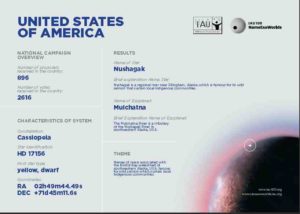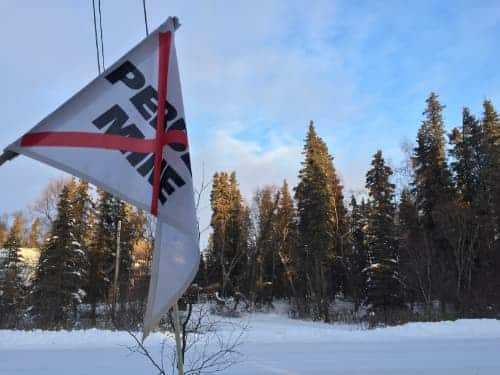
DILLINGHAM – An Alaskan, Ivory Adajar of Dillingham, Alaska Tuesday won an international competition by The International Astronomical Union (IAU) to name an intergalactic star and exoplanet. The new star and exoplanet are named Nushagak and Mulchatna after the famed Bristol Bay wild salmon river and tributary. The competition named a star designated for the United States, which was previously identified as HD 17156, and an exoplanet. Nushagak is now also a sun-like star in the constellation Cassiopeia with its exoplanet Mulchatna.
The IAU is the international astronomical organization that brings together more than 13,500 professional astronomers from more than 100 countries, and serves as the internationally-recognized authority for assigning designations to celestial bodies. Within the framework of the IAU’s 100th-anniversary commemorations (IAU100) in 2019, 110+ countries organized national campaigns that stimulated the direct participation of over 780,000 people worldwide, who proposed and selected names for each exoplanet and its host star. In the US, the IAU advanced ten finalists from 896 proposed names from around the United States that were voted on by the public. Public voting on the list of 10 semi-finalists was open until November 14, 2019. The top three selected by US voters were then submitted to the IAU100 NameExoworlds Steering Committee for the final choice on November 15. The final result was announced by the IAU at a press conference naming over 110 stars and exoplanets in Paris, France on December 17, 2019.
Ivory Adajar, a member of Curyung Tribal Council in Bristol Bay who proposed the name for the star and exoplanet, released the following statement:
“I chose the names Nushagak for a star and Mulchatna for an exoplanet after Earth’s greatest wild salmon river ecosystems that resembles the nature of the exoplanet’s orbit. Mulchatna River connects to the famous Nushagak River, and these rich and historical salmon rivers have contributed greatly to our Alaskan outdoors natural culture. Our wild salmon are known for their wiggly, eccentric paths out to the ocean and back to freshwater. We might not have this natural habitat and rich fisheries in the future, but we can have the star and exoplanet in honor of Alaska’s rich salmon culture and heritage. After winning this great honor, I plan to use it as a platform to help educate youth and others more about our beautiful starry sky above and the rich natural ecology of earth below. Quyana (Thank you).”
More information about the process for selecting the planets can be found at: https://www.fi.edu/blog/you-could-name-an-exoplanet and the press release by IAU can be found here: https://www.iau.org/news/pressreleases/detail/iau1912/.
###







